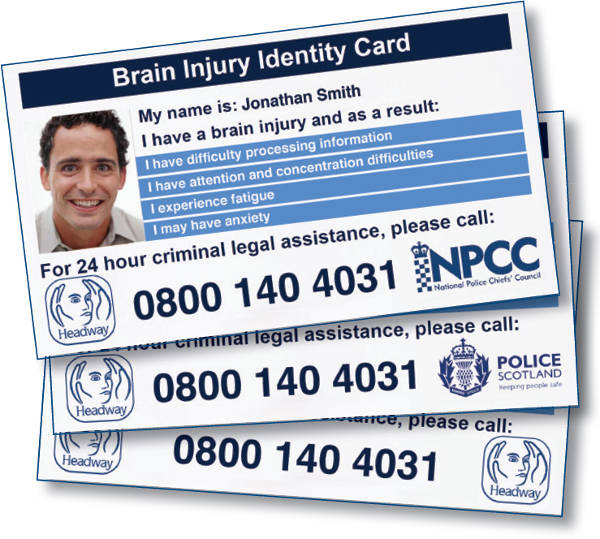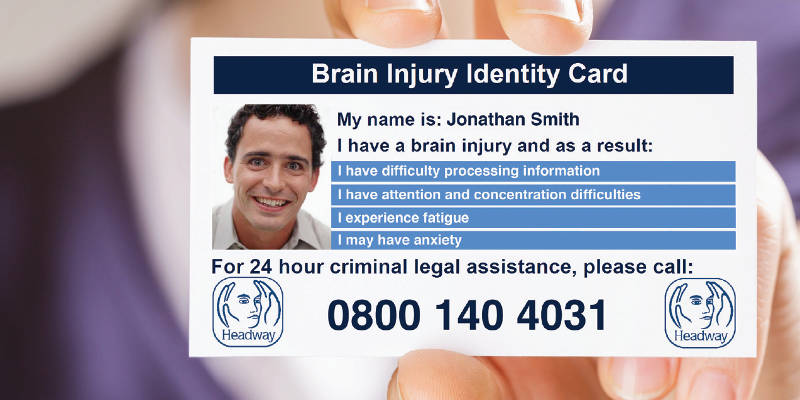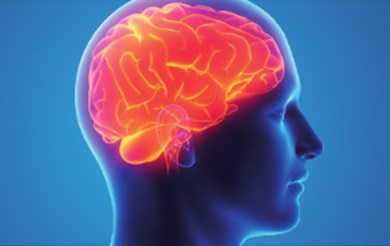Brain Injury Identity Card
A simple solution to a tricky conversation
The Headway Brain Injury Identity Card is designed to help police officers and staff more easily identify brain injury survivors and ensure that they receive an appropriate response and support.
The card can also provide brain injury survivors with added confidence in everyday social scenarios.
Each card is personalised, helping the card holder to explain the effects of their brain injury and request any support they may need.
The Brain Injury Identity Card is one of the ways in which Headway can support you after a brain injury and is free of charge.
Apply for a free Brain Injury Identity Card
Before you start the application form, please have the following ready:
1. A passport style photo of yourself, ready to upload to the form. Please ensure:
The photo is in colour
The photo is clear and in focus
The photo is without any creases or tears
You are facing forward and looking straight at the camera
You are in front of a plain background
Sunglasses are not worn (prescription glasses are permitted)
You do not have a head covering (unless it’s for religious or medical reasons)
2. Verification of your brain injury – this could be a letter from a Headway local group or branch or from a clinical professional confirming the brain injury.
Brain injury verification from a clinical professional must be a document or letter which includes your
- Full name
- Date of Birth
- Medical diagnosis of a brain injury
- Medical professional’s name/signature
- Letterhead to show where the document was produced (e.g. from the NHS or a private hospital)
Please note: due to high numbers of applications received, it may take around 1-2 weeks to process your application and send out your ID card if we have all the information we require. If you do not provide clinical verification of your brain injury in your initial application the process can take considerably longer.
Click the button below to begin your application.
The card is available to anyone in the UK aged 18 and over who has a verifiable brain injury.
If you have any questions about the ID Card or need support with your application, please email us on idcard@headway.org.uk.
Need a replacement card?
Headway can print a replacement Brain Injury Identity Card in the case of loss or damage. There is no need to complete a new application form.
Please send us an email with your full name, date of birth and address or call us on 0115 695 0406.
Unable to submit an application online?
You can download an application form (DOC) to print, complete and send back to us.
Please note, Headway will confidentially dispose of all brain injury verification documents sent to us via post. If you would like us to post these back to you, please make this clear on your application form.
About the Brain Injury Identity Card
 Why should I carry a Headway Brain Injury Identity Card?
Why should I carry a Headway Brain Injury Identity Card?
The complexities of brain injury can make it difficult for people to ask for support. Carrying an official Headway Brain Injury Identity Card can provide you with the confidence to know that if you need help, your needs can be easily identified, whether in social situations, or if you come into contact with police officers or other emergency services.
Who can apply?
The card is available to anyone in the UK aged 18 and over who has a verifiable brain injury. A similar card for children and young people is provided by the Child Brain Injury Trust.
I’m not currently involved with Headway. Can I still apply for a card?
Yes. Anyone living with the effects of brain injury can apply for a card.
Which agencies support the card?
The National Police Chiefs’ Council (NPCC), which covers England and Wales, Police Scotland, and the Police Service of Northern Ireland all recognise and endorse this card.
What is the number on the front of the ID card?
This number can be called to request criminal legal advice and/or representation from solicitors trained in understanding brain injury, should you find yourself in a situation where you need this support.
I have never come into contact with the police – is this card for me?
Absolutely! The card can be used in many different everyday social scenarios to help you access any support you may need.
What is required?
Clinical verification of brain injury and a photo are required, as well as some information about how your brain injury affects you.
How much does it cost?
The card is provided free-of-charge.
My story
"I was being treated like a common criminal"
Dominic Hurley was arrested three times for being drunk and disorderly but in each case he was simply showing symptoms of his brain injury. Dominic now benefits from a Headway Brain Injury Identity Card to help avoid misunderstanding and raise awareness of his condition.
Read storyBrain injury and the criminal justice system
Headway’s Justice Programme aims to raise awareness and improve understanding of brain injury in the criminal justice systems around the UK.
Find out moreSupporting you
From local groups or branches, our Emergency Fund, Brain Injury Identity Card, helpline and much more, find out how Headway can support you after brain injury.
Find out moreThe Justice Programme
The Brain Injury Identity Card has been developed as part of Headway’s Justice Programme, which aims to:
- Raise awareness of brain injury throughout the criminal justice system
- Improve brain injury identification
- Ensure people with brain injuries in contact with the criminal justice system are treated appropriately and provided with the support they need
- Provide brain injury survivors with access to specialist legal advice and representation
- Divert people with brain injuries away from the criminal justice system where appropriate
Case studies
Tom Birch
Like many people with brain injuries, Tom Birch walks with a slight stagger and has impaired speech. Often it gives the impression he is drunk, and this has led to unfair treatment.
Samuel Bishop
Samuel can often get confused and people struggle to understand him, which is why he’s supporting the new Brain Injury Identity Card project.
Phil Broxton
Phil often feels under pressure to prove he has disabilities to others and explain the effects or symptoms of his brain injury – which include balance problems, chronic fatigue and cognitive issues.
Nell Gregory
Nell's brain injury has left her with a number of problems that affect her memory, sight and balance problems. She also suffers from bouts of severe fatigue. She said the card has provided her with a boost in confidence, especially tackling those everyday tasks that people often take for granted.
Jamie Gailer
On 10 April, 2016, Jamie was driving home from the shops in heavy rain and lost control of his car. He sustained a cut to his head and was found at the scene confused and disorientated. Police mistakenly believed Jamie Gailer was driving under the influence of alcohol and arrested him.
Callum Maclean
A brain tumour left Callum with a number of problems such as impaired balance, affected temperament and limited mobility. These symptoms have brought many challenges, including dealing with the often inappropriate ways people react to his disabilities.
Case studies should not be reproduced without the express permission of Headway - the brain injury association.












